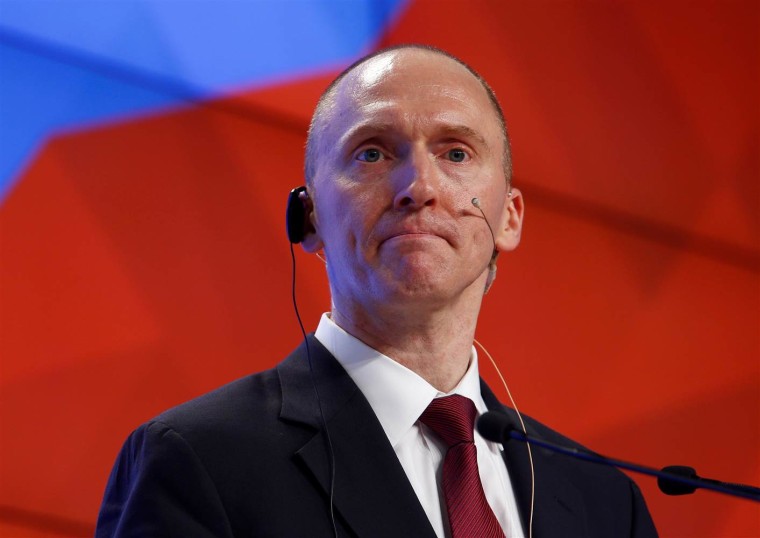House Speaker Paul Ryan (R-Wis.) has taken unfortunate steps this week to defend the release of House Intelligence Committee Chairman Devin Nunes' (R-Calif.) partisan memo targeting the Russia investigation. Ryan's argument has been disjointed at times, though he specifically told reporters on Tuesday, "There are legitimate questions about whether an American's civil liberties were violated."
And which American might that be? I'm glad you asked.
Though the public hasn't yet seen the Nunes memo, by all accounts, much of its focus is on federal surveillance of Carter Page, one of only a handful of people Donald Trump identified as a foreign policy adviser to his 2016 presidential campaign. This Carter Page.
Carter Page, who served as a foreign-policy adviser to Donald Trump's campaign, was known to U.S. counterintelligence officials for years before he became a prominent figure in a dossier of unverified research about the future president's ties to Russia.The White House is expected to release as early as this week a memo detailing what Republicans allege were surveillance abuses during the 2016 campaign. Republicans say the memo, written by the GOP staff on the House Intelligence Committee, shows that prosecutors used information gleaned from an ex-British spy -- who was paid by a research firm hired by Democratic opponents of Mr. Trump -- in their application for a secret court order to monitor Mr. Page.
This may sound a little complicated, but it's fairly straightforward: U.S. intelligence officials were keeping an eye on Page; House Republicans have a memo that suggests Page shouldn't have faced scrutiny. Much of their argument is based on pushback against Christopher Steele's Fusion GPS dossier, which Republicans reject, despite the fact that none of its central claims have been discredited.
But even putting GOP hostility toward the dossier aside, it's not altogether relevant -- because the Page controversy predates the dossier by several years. In fact, as Rachel explained on the show last night, Page was targeted by a Russian spy ring several years ago, drawing FBI scrutiny.
Six months after the spy ring was broken up, Page joined the Trump campaign as a foreign policy adviser. A few months later, Page, newly identified by Trump as someone who had the Republican candidate's ear on matters related to international affairs, traveled to Russia, met with prominent officials, and denounced U.S. sanctions against the Putin government.
It was the sort of thing that was likely to capture the interest of U.S. counter-intelligence officials -- and it did. Indeed, U.S. officials obtained a warrant to monitor Page, arguing that there was probable cause to believe he was acting as an agent of a foreign power. It was around this time that U.S. intelligence agencies briefed top members of Congress about their concerns regarding Page during the presidential campaign.
Then Trump won the election, at which point, Page went back to Moscow for another visit, during which time he again met with leading Russian officials.
And it's against this backdrop that leading congressional Republicans -- including Devin Nunes and Paul Ryan -- are effectively asking the public, "Can you believe Carter Page was under surveillance?"
To which the sensible answer should be, "Yes. That's very easy to believe. He was a suspected agent of a foreign adversary. In fact, the surveillance began before Donald Trump became a candidate."
And yet, the Republican Party and its allies are heavily invested in the idea that surveillance of Page is not only controversial, but evidence of systemic wrongdoing in federal law enforcement. It's reportedly the key point in the GOP memo that's likely to be released today.
Perhaps Republicans haven't fully thought this through. For one thing, judge-approved surveillance of suspected agents of foreign powers isn't terribly controversial. But even putting that aside, what the Nunes memo is actually doing is reminding everyone -- the public, the press, lawmakers, international observers of every stripe -- that Donald Trump's presidential campaign brought on a suspected Russian agent as a foreign policy adviser for reasons no one in Trump World has explained.
None of this makes the Justice Department of the FBI look worse. It does, however, make Donald Trump's political operation look worse.
